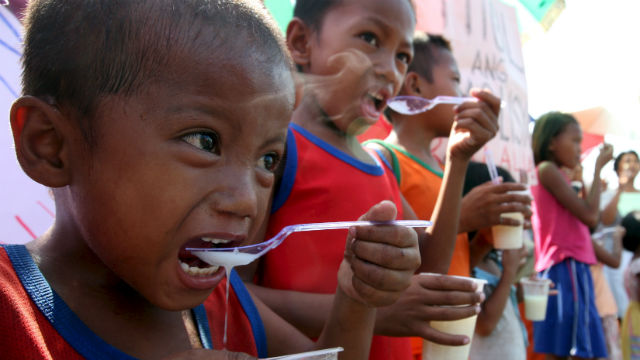Feeding Program Project Proposal In The Philippines
Project Proposal Organization WFP (World Food Programme) Project Title Targeted Life Saving Supplementary Feeding Programme for Children 6-59 Months, Pregnant and Lactating Mothers in IDP and Vulnerable Host Communities in Somalia CHF Code CHF-DDA-3485-726 Primary Cluster Nutrition Secondary Cluster. MANILA – The feeding program for children will continue despite blended learning approaches in schools amid the coronavirus disease (Covid-19) pandemic, Malacañang said Thursday.In a Palace press briefing, Presidential Spokesperson Harry Roque said instead of preparing hot meals. Buenavista Church Project Palawan, Philippines AIIAS Business Club “When God makes it happen we make it happen” Fundraising Proposal September 2012 I. EXECUTIVE SUMMARY Buenavista village is a “barangay” (small town) located in the island of Palawan, a province of the Philippines, and is part of the Palawan Adventist Mission.

Community Service Program
a Requirement in NSTP 1
STI College
Cagayan de Oro City
Submitted to:
Febe A. Bacalso
Submitted by:
Jeddan M.Ferrer
FEEDING PROGRAM
Introduction
In an effort to help the youths in disadvantaged situation, we must vigorously push for more human resource development programs and leadership capability building activities.
One common problem in our community are food. Almost every Filipino are suffering hunger and are starving to death. That affects our children and their growth. There are about 6 million malnourished children on the Philippines. With the help of every foundation, organizations, individual and our government. We can start a program that could help the children on our society on this dillema.
Feeding program is the most outreached solution we could offer to our society. Basically, it’s a best preparation to pre-school students on public school so they will encourage to eat healthy and their health are to be monitored weekly if there are any progress and development.
Objectives
To improve the nutritional health of the student To stimulate regular attendance at schools and also to introduce nutrition education. To provide an estimate of the nutritional requirements of children with moderate malnutrition, examining wasted and stunted children separately. To formulate recommendations to improve the dietary management of moderate malnutrition.

To assist indigent children in their physical, mental and spiritual development that will allow them to be at par with their age group.
Project Proposal
For the many underprivileged Filipino children, food isn’t a basic right but a luxury that their families can’t afford. To organize a new program, helping these children go up further and be part of the mainstream, where they are no longer a liability to the community. The Nutrition Component shall provide adequate food with complete nutrients to the children. Many children are hungry and are sickly, hence they cannot perform normally at home and in school.
Every day, seven-year old Cheska Miranda together with her mother walks for an hour through the busy highways of Cagayan de Oro City to get to City Central School. The young girl’s family lives in a gillage, a colloquial term for “gilid” (side) and an upscale village where informal settlers thrive on its outskirts.

When I first saw Cheska, a first grader with a fragile frame, I couldn’t imagine how she manages to walk to school for an hour every day. Her 50-year old mom Aileen Miranda shares that Cheska should have been in second grade now. But since she was always tired, they decided let her quit schooling last year.
Little did Aileen realize that sending her daughter to school on an empty stomach could make her youngest child weak and sluggish. When Cheska re-entered Grade One last school year, she was still the same frail little girl. At less than 13 kilos, she was underweight for her age.
Without any source of livelihood, and having to care for a bed-ridden husband, Mrs. Aileen depends on her three children who get seasonal jobs at a construction company.

When you say malnutrition, it just means bad nutrition. Malnutrition is the condition that occurs when your body does not get enough nutrients. Everyone who has bad nutrition usually does not have nutrients that a healthy body has.
Poverty is the main cause if malnutrition because people are not able to eat the right kind of food they need. Lack of money means lack of food and lack of food can lead to malnutrition. Kids are usually the ones being affected by this condition, especially here in the Philippines. Some may just shrug off shoulders in this case but malnutrition is a serious national problem that should be solved in the nearest possible time. This condition can lead to death. But the big question is, how would we deal with this problem?
Malnutrition can occur if you do not eat enough food. Starvation is a form of malnutrition.You may develop malnutrition if you lack of a single vitamin in the diet.
In some cases, malnutrition is very mild and causes no symptoms. However, sometimes it can be so severe that the damage done to the body is permanent, even though you survive.
Malnutrition continues to be a significant problem all over the world, especially among children. Poverty, natural disasters, political problems, and war all contribute to conditions — even epidemics — of malnutrition and starvation, and not just in developing countries.
According to the latest report of the Food and Agriculture Organization (FAO), about 4 million pre-school children in the Philippines are underweight while 3 million adolescents are chronically energy deficient.
The national situation: 70% of the population of the Philippines is children. Among Filipino parents, 35% have enough means and capacity to educate their children, 25% are able educate their children with the help of government and nongovernmental assistance. This leaves 40% whose parents have no means at all to find assistance. Their children dropout of schooling after 2 years. This 40% represents 8,000,000 Filipinos who will not be able to improve their status in life. They are hungry, uneducated and worse multiplying themselves in numbers by bringing up their own children in the same environment.

The United Nations Children’s Fund (Unicef) also reported that the case of malnutrition and stunted growth among Filipino children is greatly influenced by the pre-natal practices of mothers who do not receive proper pre-natal care. Thus, malnutrition during infancy is carried on until the child’s growing up years.
Currently, with the continuous help of the government, malnutrition cases decreased and this gave a positive effect to most of the children who participated in the program. Children can now have a full life without having to suffer from hunger and various diseases. Feeding them and giving them what they need is truly an important thing that everyone should. Parents must take the responsibility of providing them good food for their children’s well-being. The government is already giving its share in eliminating malnutrition but people should also know that not everything can be asked for. A parent should know that feeding his or her child is a responsibility that should not be neglected.
Keep in mind that in order to have a healthy body, people, especially kids, must eat good food. Everyone deserves to eat more than three times a day, everyone deserves to have a fuller life.
The foundation of a healthy mind is a healthy body, it crosses our mind to conduct a Feeding Program that envisions for a healthy citizenry.
Individuals need to be physically healthy and mentally upright for them to function properly in our society, so this project was conceptualized to sustain and ensure that childrens are eating the right foods especially for the lowly and financially unstable.
We will be able to see progress from the malnourished children as they gain weight. Undeniably, three months was too short to see progress, but this project also aspires to teach their families the importance of budgeting and providing healthy foods at a very minimal costs.
When children are well-nourished, they are more attentive and participative in school activities. Absenteeism is minimized and they get better grades.
Components to start the Feeding Program:
1.) In a feeding program, the first thing to do is assess the community. Check if the project is feasible and sustainable. The community must identify malnutrition as a problem and not merely use the feeding program as a means to feed their children. For one, you can’t make it a dole out project.
2.) Identify prospective leaders and volunteers. It is important to coordinate with the existing political or organizational hierarchy.
3.) Identify the children who badly need the assistance. To avoid bias, use the Department of Health method of identifying malnourished kids. The barangay nutrition scholar, a local public employee, knows this. I believe the community health workers know this as well. There is a standard for anthropometric measurements for Filipinos based on weight and height in determining malnutrition. This will also be your baseline in monitoring the children every month. This is to check if you are successful with your program.
4.) Always engage the community. Include the parents of the children in planning the menu, marketing, cooking, monitoring and evaluation. You can organize the mothers and even fathers to these tasks. Someday they will get the idea of the program and if they like it, then they can sustain it. Remember you don’t owe the community anything, you are just there to facilitate or be an instrument. When you feel it is time for you to go and let them do the job, then go as quickly as you can but keep a close eye.
5.) Remember to always document, monitor and evaluate. This is your basis for the success or failure of the program. These will be your hard evidence to the funding agencies. In 6 months, children can already graduate from the program, meaning their weight is already at par with their age group.
Compared to foreign food relief products, this will be made from indigenous raw materials and palatable to the Filipino taste. The Educational Assistance shall provide proper uniform, shoes and school materials for each child from the start of the school year. A student monitor will be employed to guide the parents of the children together with the school authorities throughout the school year. The Health Component shall be the counterpart of the foundation where these children, belonging to the poorest families, shall have a regular monthly examination. Medications and referrals shall be met accordingly. The Spiritual Component shall be the counterpart of the parish and parents through the coordination of the student monitor.
The initial beneficiaries shall be grades 1 and 2 with an estimated total of 300 students who have graduated from the foundation’s daycare center and underwent a psycho socioeconomic screening.
The road to a hunger-free Philippines may still be far from sight. But as long as organizations like and government continue to become part of the solution by curbing malnutrition among the poorest of the poor, there is after all, hope for children.
PRESCHOOL EDUCATION |
|---|
Kinder Summer Program (KSP)
Integrated Core Curriculum (ICC)
On-The-Spot Integrative Assessment for Preschool Education Program (OSIAPEP)
Pre-Assessment Tools for Five-Year Preschool Students via Play (PATFYOPEP)
Search for the Outstanding Pre-School Teachers of the Year
Bench Marking on Preschool Entrants’ Capabilities in the Public School
|
Feeding Program Project Proposal In The Philippines
ELEMENTARY EDUCATION |
|---|
Intensive School-Based Instructional Supervision (ISBIS)
Every Child A Reader Program (ECARP)
Child Friendly School System (SFSS)
Bright Minds Read (BMR) Program
Journalism Program
Science Teacher Researchers’ Invention Program (SPTRIP)
Accreditation Program for Public Elementary Schools (APPES)
Regional Subject Area Supervision Learning Action Cell (RSASLAC)
Read-A-Thon
MUTYA: Museo Tinggalan ng Yaman ng Araling Panlipunan
Utilization of the Developed Formative Test for Grades I-VI HEKASI
Demo Teaching for best Practices Shopping: A Roll On for HEKASI
Regional Agro Industrial Fair
Regional STEP Competition in EPP
Library Hub Program
Reading Recovery Program
Project Turn in Mathematics (Demonstration Teaching)
Children at Risk in School Needing Assistance (CaRISNA) Year I
Seminar-Work-Shop/Training in Constructing Science Investigatory Materials (SIM)
Seminar-Workshop on “AKLAT IKALAT, KAALAMAN BIBIGAT”
Madrasah Education
Mother Tongue-Based Multilingual Education (MTB-MLE)
Enhanced Instructional Management by Parents Community & Teachers (e-IMPACT) System
Enhancement Program for Edukasyong Pantahanan at Pangkabuhayan (EPP) Teachers
Organization and activation of: KATTAP-NCR Chapter (Katipunan ng mga Tagamasid at Tagapagtaguyod ng Araling Panlipunan)/Preschool Association
2012 DepEd-NCR Conference and Seminar-Workshop on Guidance and Counseling theme: the Pursuit of effective Guidance Counseling to Achieve 2015 EFA & MDG
Forum on Character Education & Values Education Theme: Character and Values Education
Project toward Excellence for Mentors of English (Project TexT for ME)
Information and Communication Technology (ICT) Program
Training Workshop on Basic Computer Literacy for Administrators and Teachers
Training/Orientation for Elementary School Heads and Teachers of DepEd Computerization Program (DPC) Recipient Schools / Interactive Whiteboard
Training Workshop on ICT Integration across Subject Areas Using Interactive Whiteboard
Demo Teaching on ICT Integration across Subjects Using Interactive Whiteboard
Supreme Pupil Government (SPG)
Home Education Program (HEP/ Home Study Program (HSP)
Gender and Development (GAD) Seminar on the Prevention of Violence against Women and Children (VAW-C)
GAD: “The Link”
|
Feeding Program Project Proposal In The Philippines 2019
SPECIAL EDUCATION (SPED) |
|---|
Expansion of SPED Program
SPED Center Monitoring
Bi-annual meeting of Division Supervisors
Regional SPED Conference on Inclusive Education
Seminar-Workshop on Acceleration Program for the Gifted and Talented Children
Training in the utilization of Teacher Manual in Handling and Managing Children with Special Needs in Inclusive Setting
Teacher Training on Applied Behavior Analysis (ABA) and Effective Academic Intervention for CWA and CLD
Seminar-Workshop on HEADSTART Program for the Gifted and Talented children
Seminar-Workshop Effective Academic and Behavior Interventions for Children with Special Needs (CSNs)
Demo-Teaching for Best Practices on Transition Program and Early Intervention in SPED
Seminar-Workshop on Music Therapy for Children with Special Needs
Seminar Workshop on Language and Speech Development for Children with Hearing Impairment (CHI)
Development of Teacher Manual on Handling and Managing Children with Special Seed in inclusive setting
Complementary Intervention SPED Private School matters
|